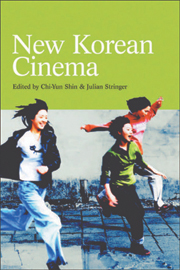Book contents
- Frontmatter
- Contents
- Notes on the Contributors
- List of Illustrations
- Introduction
- Part I Forging a New Cinema
- Part II Generic Transformations
- 6 Putting Korean Cinema in its Place: Genre Classifications and the Contexts of Reception
- 7 Horror as Critique in Tell Me Something and Sympathy for Mr.Vengeance
- 8 Two of a Kind: Gender and Friendship in Friend and Take Care of My Cat
- 9 ‘Just Because’: Comedy, Melodrama and Youth Violence in Attack the Gas Station
- 10 All at Sea? National History and Historiology in Soul's Protest and Phantom, the Submarine
- Part III Social Change and Civil Society
- Glossary of Key Terms
- Bibliography of Works on Korean Cinema
- Websites
- Index
8 - Two of a Kind: Gender and Friendship in Friend and Take Care of My Cat
from Part II - Generic Transformations
Published online by Cambridge University Press: 05 August 2013
- Frontmatter
- Contents
- Notes on the Contributors
- List of Illustrations
- Introduction
- Part I Forging a New Cinema
- Part II Generic Transformations
- 6 Putting Korean Cinema in its Place: Genre Classifications and the Contexts of Reception
- 7 Horror as Critique in Tell Me Something and Sympathy for Mr.Vengeance
- 8 Two of a Kind: Gender and Friendship in Friend and Take Care of My Cat
- 9 ‘Just Because’: Comedy, Melodrama and Youth Violence in Attack the Gas Station
- 10 All at Sea? National History and Historiology in Soul's Protest and Phantom, the Submarine
- Part III Social Change and Civil Society
- Glossary of Key Terms
- Bibliography of Works on Korean Cinema
- Websites
- Index
Summary
This chapter considers two buddy films released in 2001 that exemplify contrasting tendencies within contemporary South Korean cinema: Friend (Ch'in'gu) and Take Care of My Cat (Goyangirŭl but'akhae). Both are ‘friendship- themed’ films, the narratives of which are primarily concerned with the fluctuating relationships among a circle of close-knit school-friends as they make the transition to adult life, although Friend is directed by a man (Kwak Kyŏng-t'aek) and is about four male friends and their macho world, while Take Care of My Cat is directed by a woman (Chŏng Jae-ŭn [Jeong Jae-eun]) and is about five female friends. Interestingly, however, only Friend was actively promoted as a buddy film. With its straightforward but rather unimaginative title, Friend is presented as a film that urges viewers to think about true friendship. Also emphasised in its publicity material is the fact that the film is based on a ‘real’ story of the film's writer/director, Kwak, and his three childhood friends. Kwak, who dedicated the film to ‘my friends and family’, expressed a wish that the audience would consider contacting their old friends again after watching his film. As such, the male friendship theme in Friend is prominently used and foregrounded, whereas the issue of female friendship in Take Care of My Cat is rather subdued, only receiving the occasional passing remark in its promotional material.
- Type
- Chapter
- Information
- New Korean Cinema , pp. 117 - 131Publisher: Edinburgh University PressPrint publication year: 2005



